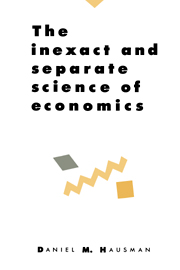Book contents
- Frontmatter
- Contents
- List of figures
- Dedication
- Introduction
- Part I Introduction, structure, and strategy
- 1 Rationality and utility theory
- 2 Demand and consumer choice
- 3 The theory of the firm and general equilibrium
- 4 Equilibrium theory and economic welfare
- 5 Models and theories in economics
- 6 The structure and strategy of economics
- 7 Overlapping generations: a case study
- Part II Theory assessment
- Part III Conclusion
- Appendix: An introduction to philosophy of science
- Bibliography
- Index
1 - Rationality and utility theory
Published online by Cambridge University Press: 04 August 2010
- Frontmatter
- Contents
- List of figures
- Dedication
- Introduction
- Part I Introduction, structure, and strategy
- 1 Rationality and utility theory
- 2 Demand and consumer choice
- 3 The theory of the firm and general equilibrium
- 4 Equilibrium theory and economic welfare
- 5 Models and theories in economics
- 6 The structure and strategy of economics
- 7 Overlapping generations: a case study
- Part II Theory assessment
- Part III Conclusion
- Appendix: An introduction to philosophy of science
- Bibliography
- Index
Summary
Microeconomics portrays individual agents as choosing rationally. Many of the generalizations that it offers concerning how people do choose are also claims about how agents ought rationally to choose. This fact distinguishes economics from the natural sciences, whose particles do not choose and are not rational, and whose theories have no similar normative dimension. It might be objected that the normative plausibility of the view of rationality implicit in microeconomics is irrelevant to its empirical assessment, but see chapters 4, 12, and 15. Those familiar with the theory of rationality may want to skim this chapter, although the criticism of revealed-preference theory in section 1.3 may be of interest.
What is it to choose rationally? This is an old philosophical question, and not an easy one to answer (Resnik 1987). For there are many kinds of irrationality, and the notion of choice itself is problematic. Economists regard choice as arising from constraints, preferences (desires), and expectations (beliefs). Economists take preferences as givens and not themselves subject to rational appraisal. But choices and sets of beliefs and preferences may be rational or irrational depending on whether they are, in a sense to be discussed shortly, consistent. In ordinary language, we would not call someone who chooses to spend every possible waking moment calculating prime numbers rational. But in the economist's sense of “rational,” Mr Number could qualify as entirely rational.
Information
- Type
- Chapter
- Information
- The Inexact and Separate Science of Economics , pp. 13 - 27Publisher: Cambridge University PressPrint publication year: 1992
Accessibility standard: Unknown
- 1
- Cited by
